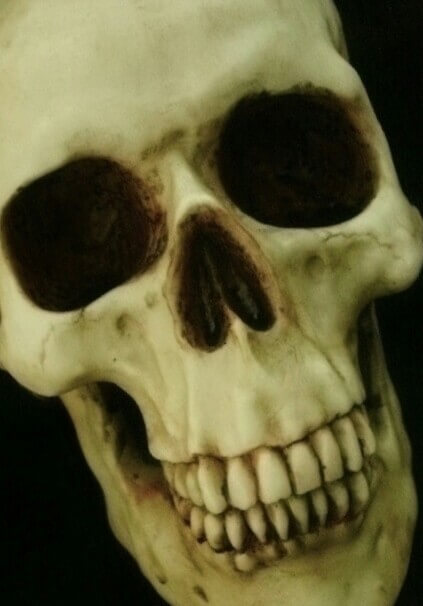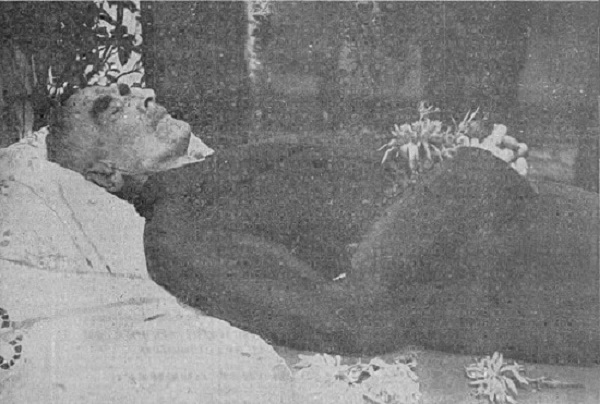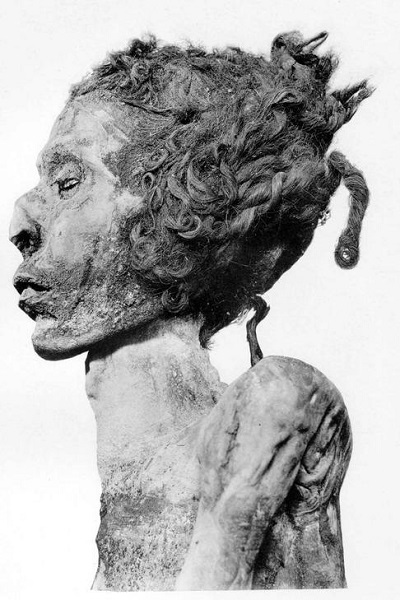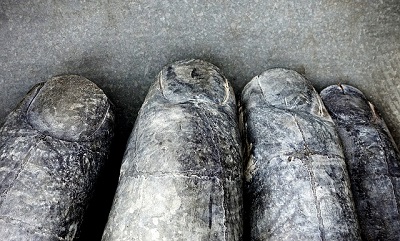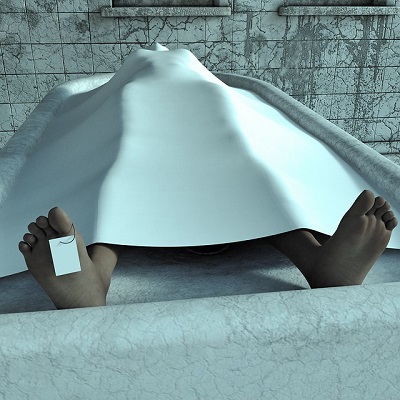Bereavement specialist Sharon Maher answers interesting questions about her experience in working with the dead. Some of the following content may be disturbing for some viewers.
1. In the mummification process, Egyptians pulled out the brain through the nostrils. Do embalmers remove the brain?
I do not remove the brain, however if a body is autopsied, it is likely the brain would be removed during that process for studying. When the removal of the brain has occurred, than the embalmer will have to pack the empty cavity before suturing the skull back together, otherwise it can settle strangely and will not have a natural look. There is also potential for fluids to leak out. Packing the cavity with cotton creates the “brain” and then we reconstruct the cranium by suture or by using skull clamps. We use cotton in the nose and throat as well in order to avoid purging.
It is important to remember that when a person dies, biology takes over and begins to break down the body. This can result in gastric pressure that forces fluid from the lungs and stomach up through the esophagus and has potential to escape through the mouth and nasal passages. This is what embalmers call “purge” and can be quite upsetting for a family to see. This is why techniques such as cotton are used and embalmers train to disguise everything so the body looks as natural as possible.
2. How long does it take to prepare a body?
It depends. The general guidance is about 2.5 hours for an average embalming, which is usually a person who died naturally or of old age. If someone dies suddenly or at a young age, the body will likely need to be an autopsy, which could double the time it takes to embalm because you have to embalm each limb separately and do a lot of suturing.
Fun fact: Bodies that are jaundice have a different chemical to embalm with since normal formaldehyde fluid will turn the corpse green. This is because formalin reacts quickly with bilirubin, which is a compound found in bile and can indicate liver damage.
3. Do fingernails and hair really keep growing after death?
No. It appears that way because the skin dehydrates and shrinks, which creates the illusion that the nails and hair are still growing.
4. Is embalming required for cremation?
No. Embalming is really only required for travel, such as a plane. It is also worth considering if the funeral service will be several weeks from the time of death (if the family wants the body present at the time of service).
Related article: The Cremation Process, Explained
5. How long does it take the human body to decompose after death?
There are five stages to decomposition once a person has died. First, the internal organs start to decompose which on average takes about 24-72 hours. Three to five days after, the body begins to bloat and gas accumulates in the gut. Several weeks the teeth will begin falling out. Around the first month mark, the body will begin liquefying.
However, other factors can contribute. Going back to the Egyptians, they started creating embalming practices after realizing that the dry desert sand would preserve the corpses because it was dehydrating the skin at a quick enough rate. In addition, if the conditions are cold, it will naturally preserve the body as well. Hot summer days will excel the speed of decomposition or if a body was in water.
6. How well does embalming preserve the body?
It can be difficult to say since the process only delays the inevitable of decomposition. The technique and strength of the embalming chemicals used can preserve the body for a lengthy amount of time, but since we do not often unbury previously embalmed bodies, it is hard to have an accurate number. I embalmed one person whose family was out of the country and could not all be together for a service immediately, four months later and he was still well preserved.
7. Do you use sutures to sew people’s eyes and mouth shut?
Not exactly. There are techniques using suture for the mouth, however the more commonly used tool called a “Needle Injector” which is a contribution that automatically releases like a spring under pressure. A “needle” (a very small screw at the end of a long gold wire) is anchored one into the maxilla and the second into the mandible. The wires are than twisted together until the mouth holds shut.
Eye caps are small plastic spheres that have a spikey textured side and a smooth side. They sit on the eyeball with the spikey side out and the eyelid is laid over top of it. The texture holds the eyelid shut, however glue is sometimes used if the skin is dehydrating and retracting to the point it does not look natural.
8. Do any religions forbid embalming?
Orthodox Jewish faiths do not embalm and in fact will not bury their loved ones in a casket that is not made of all natural material. Buddhist and Hindu faiths cremate. Muslims consider it a desecration of the body.
9. Does being around a lot of grieving people at work affect you emotionally?
Occasionally I will find myself tearing up at a funeral. What gets to me is observing the pain of those left behind after their loved one dies. I have experienced significant death in my life, including my father and a boyfriend and every once in a while I find myself wishing there was a way to save them from the journey of adjusting to a new life without their loved one. The truth is however that they have to make that journey themselves and all we can do is be present beside them while they do.
10. What is the most challenging part of your job?
Burn out is high in this field. There was one time I was awake for over 24 hours because I just kept getting call after call after call to remove a body and then had funerals and embalming’s scheduled. Death has his own agenda and is not concerned with holidays, time of day or sleep.
I recall one specific time I was in the middle of taking an exam for an online class and had to leave for a call. My coworker drove the van while I had my friend on the phone reading me the questions and inputting the answers for me. Not being in control of my time is a huge challenge for me.
11. Can you share one of your most unusual experiences in your career as an embalmer?
I have so many, from digging out hoarders from under their hoard to a man with three feet. I once picked up a body who was in a sleeping bag full of marijuana, there was such a massive amount of it we had to zip up the bag and take him along with his stash!
One of the creepiest experiences I have had was a middle-aged woman who lived in a cabin out in the woods. Not just “out in the woods”, but deeply isolated with no modern technology or convenience. This is not uncommon in a rural area, but there was not even a road to get to the cabin. A coworker, two sheriffs and I walked for an hour on a tiny little foot path carved out on the side of a hill. Literally, one foot in front of the other as the path width would not allow for wiggle room. Once we got to the cottage, there were several religious symbolism all over the walls. Some from faiths I recognized, some I had never seen. The cabin was full of journals that had writing and scribbles all over the pages.
After collecting her body, we made a difficult hike back to the van having to carry the gurney since the path did not allow us to set it down. The sun was setting so our journey back was in the pitch dark, with both officers trying to illuminate our walk with their flashlights. We made it to the point we could see the van, but had not reached it yet, when suddenly all four of us at the same time stopped and jerked our heads to the left. It was such a weird moment with the air suddenly still and that sort of silence where not one single sound existed. We all stared into the darkness for a moment, then at each other. One officer thought he heard a woman’s voice yell something, I thought I had felt a presence as if a person had just walked up alongside of me. We all felt ‘something’ in that moment, but there was nothing out there but us.
12. In your career, did you ever speak to the dead?
I do not know about other embalmers, but I definitely held conversations with the dead I encountered. I always felt like my job was about “guiding” these people into the afterlife. Much like Charon (doesn’t hurt he has the same name as me!), the ferryman who carries the souls of the dead across the river into the underworld, I feel it’s my duty to make sure a person’s body completes the process from death to final disposition and I suppose I communicate with them as a way to show respect.
13. Have you ever had to deal with babies? In addition, how do you do that?
I did. I have embalmed very tiny stillborn babies and it can be very sad. I have known embalmers who would not work on young aged persons because it was too difficult. For me, I just felt like it was one thing I could give to the family so they can have the closure they need for such a difficult situation.
14. Do they move or make noise?
Yes! Well, they make noise as you move them. Air that can be trapped in the body will
sometimes be pushed out when moving the remains and can create a sound.
This never bothered me much, but I DID have an experience once putting a body away in the fridge. I accidentally knocked (or at least that is the best I can guess happened) against another person, which caused their arm to fall and their hand to brush my butt.
